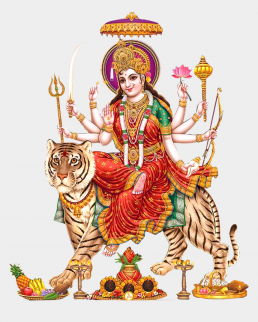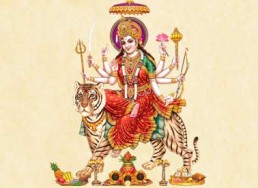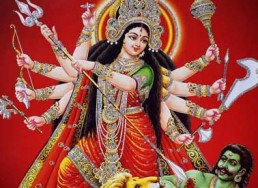Tantrokta Ratri Suktam
निद्रां भगवतीं विष्णोरतुलां तेजसः प्रभुः ॥१॥
ṇidrām Bhagavatīm Vissnnor-ātulām ṭejasah Prabhuh ||1||
त्वं स्वाहा त्वं स्वधा त्वं हि वषट्कारः स्वरात्मिका ।
सुधा त्वमक्षरे नित्ये त्रिधा मात्रात्मिका स्थिता ॥२॥
ṭvam Svāhā ṭvam Svadhā ṭvam ḥi Vassattkārah Svara-[ā]atmikā |
Sudhā ṭvam-ākssare ṇitye ṭridhā ṃātra-[ā]atmikā Sthitā ||2||
त्वमेव सन्ध्या सावित्री त्वं देवि जननी परा ॥३॥
ṭvam-ĕva Sandhyā Sāvitrī ṭvam ḍevi Jananī Parā ||3||
त्वयैतत् पाल्यते देवि ! त्वमत्स्यन्ते च सर्वदा ॥४॥
ṭvayai[ā-ĕ]tat Pālyate ḍevi ! ṭvamatsy-ānte Ca Sarvadā ||4||
तथा संहृतिरूपान्ते जगतोऽस्य जगन्मये ॥५॥
ṭathā Samhrti-ṟūpa-ānte Jagato[ah-ā]sya Jaganmaye ||5||
महामोहा च भवती महादेवी महासुरी ॥६॥
ṃahā-ṃohā Ca Bhavatī ṃahā-ḍevī ṃahā-Surī ||6||
कालरात्रिर्महारात्रिमोहरात्रिश्च दारुणा ॥७॥
k͟hālarātrir-ṃahārātri-ṃoharātriś-Ca ḍārunnā ||7||
लज्जा पुष्टिस्तथा तुष्टिस्त्वं शान्तिः क्षन्तिरेव च ॥८॥
l̤ajjā Pussttis-ṭathā ṭussttis-ṭvam ṣāntih k͟hssantir-ĕva Ca ||8||
शङ्खिनी चापिनी बाणभुशुण्डी परिघायुधा ॥९॥
ṣangkhinī Cāpinī Bānna-Bhuśunnddī Parigha-[ā]ayudhā ||9||
पराऽपराणां परमा त्वमेव परमेश्वरी ॥१०॥
Parā-[ā]parānnām Paramā ṭvam-ĕva Parame[a-īi]śvarī ||10||
तस्य सर्वस्य या शाक्तिः सा त्वं किं स्तूयसे तदा ॥११॥
ṭasya Sarvasya ẏā ṣāktih Sā ṭvam k͟him Stūyase ṭadā ||11||
सोऽपि निद्रावशं नीतः कस्त्वां स्तोतुमिहेश्वरः ॥१२॥
So[ah-ā]pi ṇidrā-Vaśam ṇītah k͟has-ṭvām Stotum-īhe[a-īi]śvarah ||12||
कारितास्ते यतोऽतस्त्वां कः स्तोतं शक्तिमान् भवेत् ॥१३॥
k͟hārita-āste ẏato(ah-ā)tas-ṭvām k͟hah Stotam ṣaktimān Bhavet ||13||
मोहयैतौ दुराधर्षावसुरौ मधुकैटभौ ॥१४॥
ṃohayai[a-ĕ]tau ḍurādharssāva[au-āa]surau ṃadhu-k͟haittabhau ||14||
बोधश्च क्रियतामस्य हन्तुमेतौ महासुरौ ॥१५॥
Bodhaś-Ca k͟hriyatām-āsya ḥantum-ĕtau ṃaha-āsurau ||15||

Description
Ratri Sukta is one of the famous hymn to Goddess Durga. This in true essence praises the latent energy in Narayana and in every sadhak. Ratri Suktam is used to invoke that energy and to enhance the mind powers. It is also used by people having sleep disorder. Recitation of Ratri Suktam bring one’s mind in tune to sleep quicker. This also tunes up the energy level in the body. Another meaning is, Ratri Suktam defines the omnipresence and omnipotence of Goddess Durga, She is the energy prevading all forms of life. She is the power in mantras. She is the energy of getting success in all endeavours. She provides everything to her sadhak. She can destroy obstacles, enemies and every negative outcome. The energy of Durga is the cause of love, harmony, happiness and prosperity.
Other Durga Shlokams
Argala Stotram
Argala Stotram is the most famous prayer of Goddess Shakti (Durga) written by Markandeya Rishi. It has a twenty-six Verse. Before completing the Durga Saptasati (Devi Mahatmayam), in the first place,
Ayigiri Nandini
The Mahishasura Mardini Stotram also known popularly as Aigiri Nandini, holds immense significance during Navratri. The word Mahisha means buffalo and Asura means Rakshasa or Demon. Composed by the great sage Adi Shankaracharya around 810 AD, this…
Devi Aparadha Kshamapana Stotram
Composed by Sri Adi Shankaracharya. Aparadha Kshamapana stotram is usually recited after a recital or after the completion of Puja. Its like asking for forgiveness from Goddess for various mistakes th
Devi Suktam
Devi Suktam or the Vaak Sutam (Vak suktam) occurs in the 10th mandala of Rig Veda Samhita as suktam number 125. The seer of the mantra is vak, the daughter of rishi ambharnaa,
Durga Suktam
This is a prayer to the fire god Agni occurring in the Maha Narayana Upanishad. Section two. Agni, the Lord of Fire, symbolises the power of action.Goddess Durga symbolizes dynamism, energy, diligence
Kalika Ashtakam
Composed by Sri Adi Shankaracharya on devi Kalika. The Goddess Kali is the guardian, also known as Kalika. The protectors, the Mother, Kali is Dharma and eternal time. Kali shines with the brilliance
Keelaka Stotram
Rishi Markandeya tells his disciples in sixteen shlokas the ways and means of removing obstacles faced by devotees while reading Devi Mahatmya. Reading of Keelakam brings blessings of Devi, spiritual
Mahishasura Mardini Storam
Mahishasura Mardini Stotram - This is a prayer to the Goddess who killed Mahishasura. “The place where Sri Mahishasura Mardini Stotram is sung every day, I will always be present and never leave.” - The Devi’s proclamation in the 12th chapter of the…
Sarva Mangala Mangalye
Sarva Mangala Mangalye - Salutations to you O Narayani, who is the auspiciousness of all that is auspicious, the consort of Lord Shiva, who is the means of accomplishing all desires, and who is the refuge of all, the consort of the three eyed Shiva,…
Shakradaya Stuti
This famous stuti is sung by Shakra (Indra) and the other devas in praise of Durga. This is part of Chandi path which is a text about Goddess Chandi. It is also called Durga Saptashati or 700 verses r
Tantrokta Ratri Suktam – Durga – In Sanskrit with English Transliteration, Translation and Meaning. Commentary for selected Shlokams.


